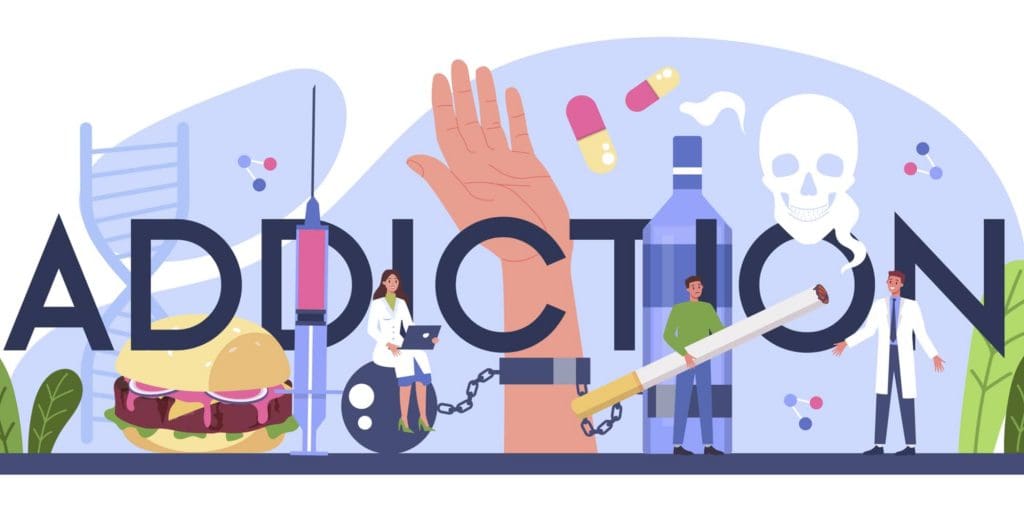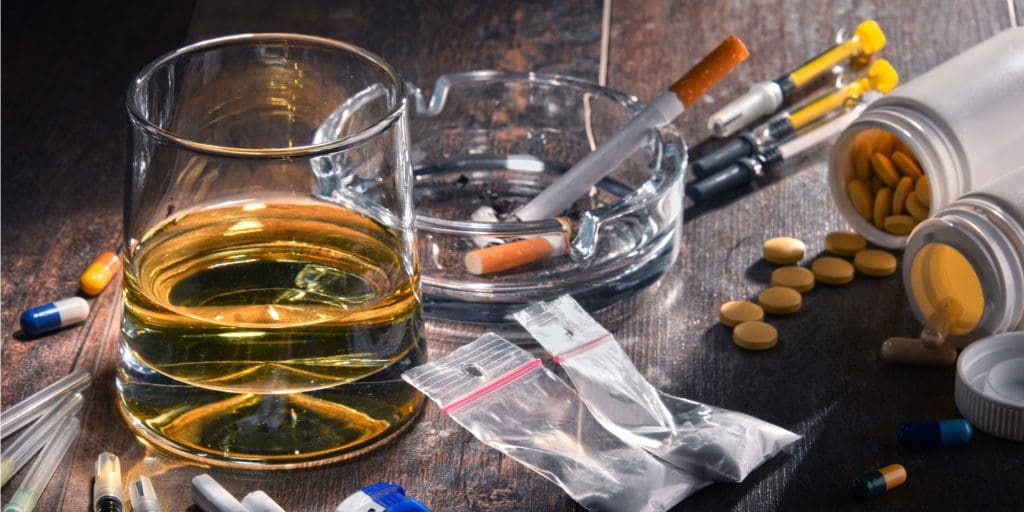Addiction is an complex disorder that centers around compulsive behaviors. In general, the addiction definition is about a strong desire to do an activity that you know is harmful. The most obvious addictions are substance abuse, like alcohol addiction or drug addiction. However, taking drugs or alcohol are not the only activities a person can become addicted to. Naturally, the signs of addiction and the treatment of addictive behavior will depend on the types of addiction that a person encounters.
Nearly anything that activates the brain’s reward system has the potential to be addictive. This includes both substances (drugs and alcohol) and behaviors (gambling, shopping, internet use, etc.). As such, the two main types of addiction are recognized as chemical addiction and behavioral addiction. Understanding the nature of the addiction and whether the problem is substance abuse, obsessive behaviors, or a combination of both will allow for the most effective treatment plan to be developed.
Understanding Addiction & The Pleasure Center of the Brain
Addiction changes the chemistry in the brain. It does this by interfering with how the brain sends and receives signals. When a person takes a drug or becomes addicted to a behavior, the brain releases chemical rewards (like dopamine) at a much higher rate than normal. Over time, the brain comes to expect this level of reward and triggers cravings to encourage another fix.
A lot of daily activities activate the reward response. For example, normal occasions such as eating or socializing produce a reward in the brain that encourages the person to enjoy and repeat these activities. When drugs or obsessive behaviors are at play, the reward is amplified. This excessive chemical release introduces the brain to larger rewards and an increased desire to repeat these addictive behaviors.
Types of Addictions

Today, there are two types of addiction. However, historically, chemical addictions were the only recognized addictions. Addicts were viewed as morally inept and lacking willpower. More recently addiction became viewed as a disease that expands beyond drug or alcohol abuse to non-substance or behavioral addictions. In fact, for the first time, the Diagnostic and Statistical Manual (DSM-V) included gambling as an addictive disorder, justifying the behavioral addiction concept. However, there are some differences between these two main types of addiction.
Chemical Addiction

A chemical addiction refers to an addiction to one or more substances. Drug addiction could be physical, psychological, or a combination of both. Physical addiction generally refers to a drug or alcohol dependency. When a person goes through drug detox, it is usually to break the physical dependence that’s developed. In some cases, physical addiction can occur without a mental addiction. For example, a prescription medication could cause chemical dependency, even if the drug was taken as advised. If someone with a physical dependency quits cold turkey, withdrawal they may develop withdrawal symptoms.
On the other hand, a psychological addiction generally describes the mental connection a person has with substance use. The substance could be an addictive drug (such as cocaine) or a legal substance (like sugar or caffeine). In either case, psychological addictions can be just as potent as physical addiction. And an inability to fulfill a mental craving can result in significant distress, even if the body isn’t experiencing physical withdrawals.
Behavioral Addiction
Unlike substance use disorders, behavioral addiction may not include drug use at all. Rather, a person becomes addicted to an activity that activates the brain’s reward system in ways similar to substance use. The DSM-V only recognizes gambling addiction as a diagnosable behavioral addiction. However, many other activities are can be addictive as well. These include:
- Exercise
- Eating
- Sexual activity
- Shopping
- Using social media
- Watching pornography
- Lying
- Stealing
- Playing video games
It’s difficult to pinpoint why some people become addicted to behaviors and others do not. However, some causes of addiction are thought to include genetics, exposure to trauma, and mental health. The good news is that treatments similar to those used in substance abuse treatment have been found effective in treating behavioral addictions.
How Addiction Treatment Can Help
Whether substance-related or behavioral, signs of addiction often include intense cravings, a loss of control, and compulsively maintaining the addiction, even when it is clearly self-destructive. As such, both types of addiction can wreak havoc in a person’s life. Fortunately, addiction treatment can help. However, to be effective it is important that the addiction treatment facility knows how to treat not only drug addiction, but also behavioral addictions and other mental health conditions as well.
Addiction Treatment in Central Florida
At The Blackberry Center in Central Florida, our treatment model is simple: to guide you to a life without addiction. To accomplish this, we consider your individual case and work with you to create a recovery plan based on your personal experience with substance-related or behavioral addictions.
Drug-related addiction treatment at our accredited facility usually begins with detox followed by inpatient addiction treatment. Inpatient addiction treatment ensures that we are able to assist you 24/7 in a safe environment.
Behavioral addictions may also follow an inpatient format but would not require detox. If both a substance-related and behavioral addiction are present, our treatment team has the ability to treat these disorders at the same time in our dual diagnosis program.
In either case, our treatment plans offer a variety of therapeutic methods to support your recovery. These include programs like:
- Medication support (if needed)
- Client intake evaluation
- Dietary planning
- Recreational Therapy
- Group therapy
- Personalized assessment of drug and alcohol habits with an addiction specialist
- Discharge planning
It is our mission at The Blackberry Center to provide a full continuum of care that provides assistance with recovery before, during, and after treatment at our addiction treatment facility. To learn more about addiction treatment options in the Orlando area, contact our admissions specialists at (813) 908-4199 or use our confidential online form. At The Blackberry Center, you do not have to suffer from addiction alone, we will be with you every step of the way.

